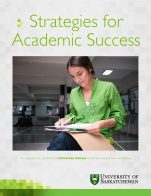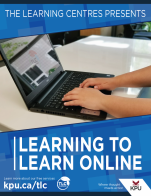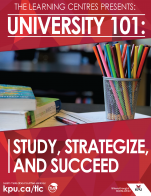
Access these videos and more from LinkedIn Learning (HUB.rrc.ca).



This box contains Open Textbooks. Check out the Library's OER page for more information.
 Strategies for Academic Success
by
University of Saskatchewan
Strategies for Academic Success
by
University of Saskatchewan
 Learning to Learn Online
by
Kwantlen Polytechnic University Learning Centres
Learning to Learn Online
by
Kwantlen Polytechnic University Learning Centres
 University 101: Study, Strategize, and Succeed
by
Kwantlen Polytechnic University Learning Centres
University 101: Study, Strategize, and Succeed
by
Kwantlen Polytechnic University Learning Centres
Have you thought about what happens in your brain when we learn? If so, you are thinking about the science of learning. A lot is happening in our brains when we learn, including the building of new connections between neurons.
Your goal - as a student - is to help your brain strengthen these connections, thereby committing your material to long-term memory. Furthermore you'll be able to extend and apply the material you've learned.
You can strengthen your brain's neurons through active learning strategies such as retrieval practice (i.e. quizzes and tests) and spaced practice (i.e. studying for 30-min blocks over a few days rather than 4 hours straight). This is brain-based learning. Science shows us that breaks, rest and sleep between learning and study sessions enhances learning and continuous repetition and retrieval makes your neurons stronger and more efficient.
We know more about the brain’s role in learning than ever before. Check out the top brain-based learning tips we want every Red River College Polytechnic student to know! Remember you can also connect with an Academic Coach for one-on-one assistance.
What is the difference between understanding a class lecture and truly learning the knowledge or skill covered in class? If you think about it, you realize it really is a question of time.
Imagine yourself in class. You may, at the time of a lecture, feel like you understood the point of the class. You may even have gone home feeling confident and ready for the next day. But, come test time, if you haven’t practiced or used the information in some way, you may find that your brain has simply let that information go.
One of the brain-based explanations for this is that you did not move that initial understanding to long term memory. Regularly practicing and revisiting new material acts as a signal to the brain to hold on to information and commit it to memory. Connections between brain cells, or neurons, physically become stronger and faster with practice or repetition.Learning is a physical process, just like building muscle. It takes time and repetition to strengthen and make learning and memory more powerful.
This tip is a fun one — and simple. Be curious! If you cultivate a sense of curiosity about your program, you’ll enjoy studying AND you’ll enhance your ability to remember new information. A recent study published in the journal Neuron demonstrated a few cool things about the effect of curiosity on learning. The most important finding was that simply being in a state of curiosity increases memory.
Researcher Matthias Gruber says curiosity puts the brain in a state that is conducive to learning, “like a vortex that draws in what you are motivated to learn, and everything around it.” You can check out a video explanation of their research here.
It may seem like common sense, but taking care of the physical needs of your brain can help optimize your learning ability. Take a look at this fun video to learn the best ways to care for your beautiful brain.
This is one of the most powerful tips we have for you. Essentially, it comes down to how you approach your own intellectual growth. Psychologists now know that your attitude towards learning has a great effect on success in school, and in your career. They have found that students with growth mindsets, or the belief that ability and talent can be developed, have greater motivation, higher grades and higher test scores.
A classic example, and one that we hear every year at Red River College Polytechnic, is the the claim that “I’m just not good at math”. Most often this is simply not true. Other factors, including motivation, effective teaching, and self-confidence in learning math have influenced the way they view their math ability. We at the ASC know that math ability can be increased. We see this everyday as students work with their tutors. Students move from believing they are “bad at math” to finding joy in solving math problems and doing assignments that involve complex math calculations.
That’s right. There is such a thing as positive stress!
A little bit of stress, or better, a sense of challenge, is actually good for the brain and for learning. Studies now show that short-term bursts of stress can positively impact mental function. You will feel stress in college, and it’s critical that you learn to manage it effectively. More importantly, it’s important be aware of your own abilities to manage stressful situations when they arise. Once you understand that feeling pressure is not necessarily a bad thing, you can re-frame your reaction to pressurized situations positively. When possible, ask yourself to rise to the challenge before you. See intense college moments as opportunities for growth, not points of defeat. This will help you manage stress, and stop it from managing you.
Of course, sometimes stress is debilitating. And it can have a negative impact on learning. One key understanding is knowing the difference between long term stress (chronic) and short term stress. Chronic stress occurs when we lack the coping skills needed to deal with emotional pressure over a prolonged period of time. Chronic stress inhibits learning and needs to be managed. Check out RRC’s Counselling Services if you feel you are living with chronic stress and need help, coping tools or simply a friendly face to talk to.
Other studies show that our attitude toward stress radically alters the way it manifests in our bodies. Check out Kelly McGonigal’s powerful TED talk on new research that suggests that stress may only be bad for you if you believe that to be the case: